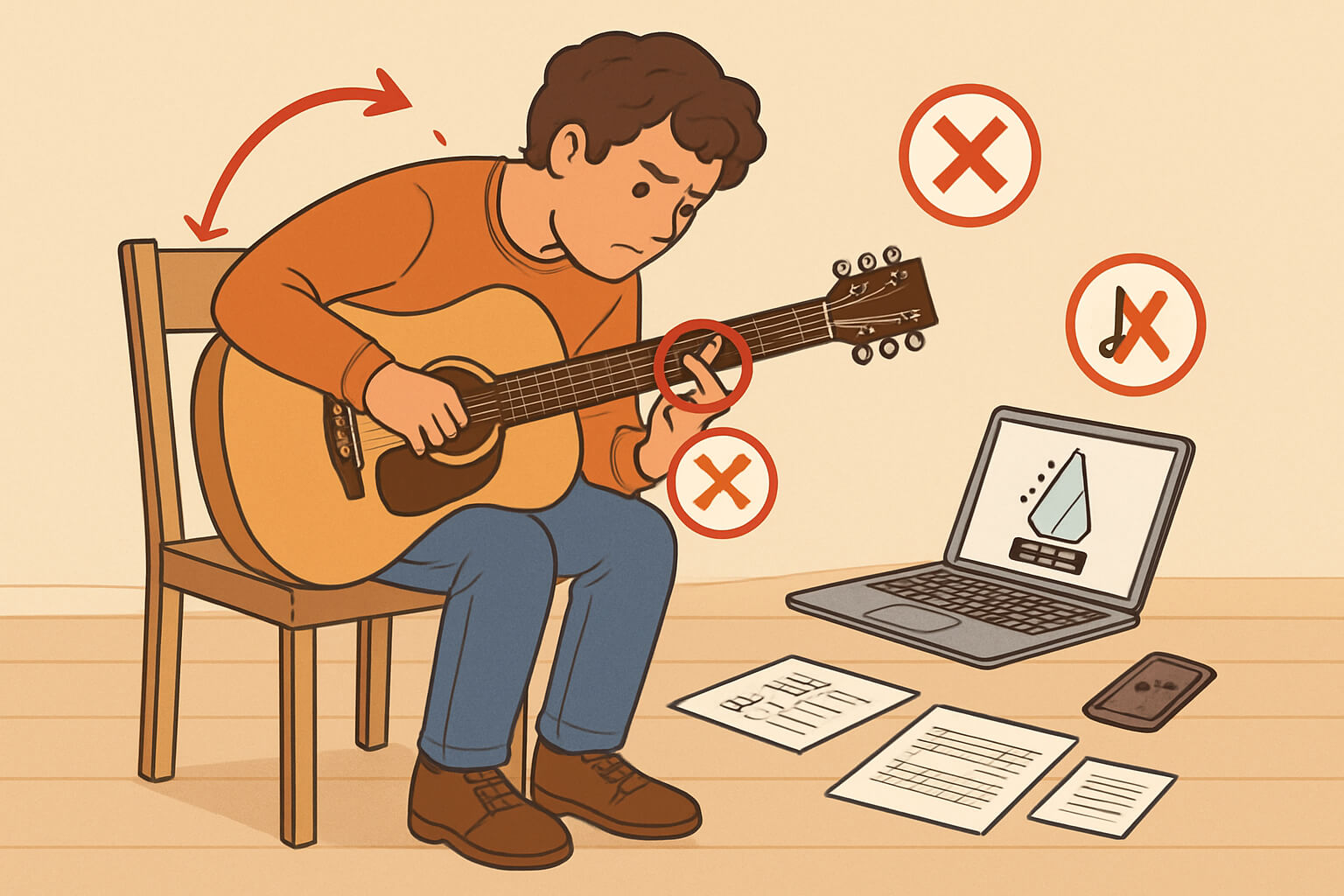The Biggest Mistakes Beginners Make While Learning Music

Starting your musical journey is thrilling, but it’s easy to fall into traps that can slow your progress or even make you feel discouraged. Knowing the most common mistakes that beginners often make—and understanding how to avoid them—can save you valuable time, frustration, and energy.
Let’s explore the biggest pitfalls to watch out for when learning music and how you can steer clear of them.
1. Skipping the Basics
- It’s tempting to dive straight into playing songs, especially if you’re eager to impress friends or post a video online. However, rushing past fundamental skills can hurt your long-term development. Here’s what you might be skipping:
- Proper posture and hand positioning: Bad posture and incorrect finger placements can lead to discomfort, strain, and bad habits that are tough to break.
- Basic rhythm and timing: Understanding the foundational concepts of rhythm will help you stay in time with the music and make learning more complex patterns easier.
- Simple scales and exercises: Scales aren’t just boring drills—they teach you about intervals, finger coordination, and help solidify the basics of music theory.
- Solution: Slow down and spend time on these core skills. Mastering the basics will make everything you do later much easier.
2. Overloading on Theory Too Soon
- Music theory is incredibly useful, but if you jump into advanced concepts like modes, altered chords, or counterpoint without mastering basic concepts, you’ll quickly become overwhelmed. It’s easy to get lost in terms like “diminished seventh” or “parallel modes” when you should be focusing on simple chord progressions and basic scales.
- Solution: Learn practical skills first (like learning to play melodies, basic harmony, or rhythm patterns) and let theory complement your playing gradually.
3. Practicing Without a Plan
- Practicing aimlessly or “playing” without any specific goal is a waste of time. Improvement happens when you have a clear focus in your practice sessions. Instead of mindlessly repeating a piece over and over, break it down into specific targets, such as:
- Learning a new chord progression.
- Mastering a tricky rhythm.
- Building finger strength or dexterity.
- Solution: Structure your practice. Set small, attainable goals, and track your progress. This could be as simple as spending 10 minutes on a scale exercise or mastering a new chord change.
4. Ignoring Ear Training
- Too often, beginners become fixated on sheet music or video tutorials without developing their ear. Being able to recognize notes, intervals, and chord progressions by ear is an invaluable skill that will drastically improve your playing and creativity. Ear training is essential for:
- Playing music by ear.
- Recognizing patterns and chord progressions quickly.
- Enhancing improvisation and songwriting skills.
- Solution: Dedicate some time each day to ear training exercises. Start small with intervals (like recognizing a perfect fifth vs. a major third) and progress to more complex exercises.
5. Comparing Yourself to Others
- It’s natural to admire skilled musicians, especially when you see their polished performances online. However, comparing your progress to theirs can be detrimental to your growth. Here’s why:
- Everyone progresses at their own pace—even advanced musicians had to start somewhere.
- Social media shows a highlight reel, not the full picture. You may see an artist playing flawlessly but not the countless hours of practice behind that moment.
- Solution: Focus on your own journey. Celebrate small wins and remember that slow, steady progress is more sustainable than rapid, fleeting achievements.
6. Not Recording Practice Sessions
- It’s easy to miss mistakes when you’re deep into playing. Recording your practice sessions—whether on your phone, a DAW, or a simple recorder—allows you to listen back and catch things that slipped by in the moment.
- Solution: Record snippets of your practice and listen with a critical ear. You might be surprised by what you hear—whether it’s a missed note or a rhythmic inconsistency.
7. Inconsistent Practice Habits
- Inconsistency is a killer when it comes to learning any skill, including music. Practicing for a few hours once a week isn’t as effective as practicing 15-30 minutes daily. Small, regular sessions are better than sporadic, long bursts of effort.
- Solution: Aim for daily, bite-sized practice sessions. Even just 20 minutes a day can lead to steady improvement, especially if you break the time up into specific goals.
8. Neglecting Fun and Creativity
- It’s easy to get bogged down with drills, exercises, and technique work. But if all you do is practice scales and chord shapes, you risk burning out and losing your love for music. Fun and creativity are key to maintaining long-term motivation.
- Solution: Allow yourself time to play your favorite songs, improvise, or experiment with new ideas. Whether it’s learning a pop song by ear or jamming over a chord progression, creative freedom keeps the process exciting.
Final Thoughts
- Avoiding these common mistakes can significantly improve your learning process. Remember to focus on mastering the basics, practicing with purpose, and maintaining a fun, creative balance. Music is not just about technique—it’s about expressing yourself and enjoying the journey along the way.
- The road to musical mastery is long, but with consistent effort and smart habits, you’ll keep making progress—and most importantly, you’ll have fun while doing it!
Suggested Read Next:
